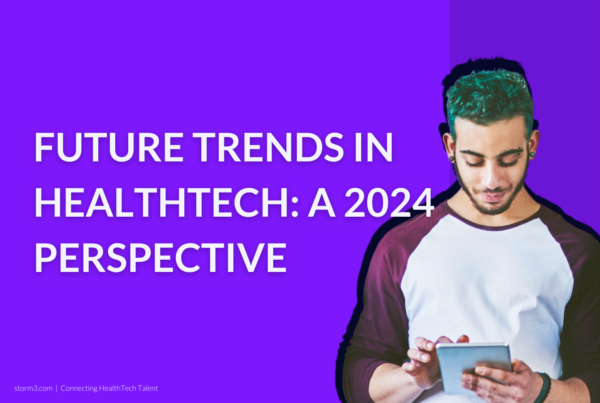Just like Artificial Intelligence (AI), the Metaverse is also a buzzword that you may have come across in recent years. While the space is still in the early days, the global market for Metaverse was already estimated at US$107.1B in 2020, and this is projected to reach a revised size of US$758.6B by 2026, growing at a compound annual growth rate of 37.1%.

In recent years, not only did the term ‘Metaverse’ rapidly emerge, but it has been disrupting a variety of industries such as financial services, education, retail, consumer brands, and more. However, it’s arguable that through Metaverse, the healthcare industry could see the most improvement and changes in how we interact with healthcare.
What is Metaverse?
You have most likely come across Mark Zuckerberg’s rebranding of Facebook to Meta, live virtual concerts in the popular game Fortnite, or even the digital art gallery in Decentraland, but did you know these are all examples of the Metaverse?
The actual term of the “Metaverse” was coined by author Neal Stephenson in his 1992 sci-fi novel Snow Crash. According to Mathew Ball, a venture capitalist and angel investor who has written a series of essays regarding the potential and structure of the Metaverse, it is defined as “a 3D version of the Internet and computing at large”.
Ball states that there are two ways to place this in the modern context:
“When these two technologies (internet and computing) first emerged, all interactions were primarily text-based (emails, messages, usernames, email addresses). Then they slowly became more media-based (photos, videos, livestreams). The next elevation of user interface and user experience is into 3D. Secondly, if we think of [a] mobile [phone] as placing a computer in our pocket and the internet being available at all times, think of the Metaverse as always being within a computer and inside the internet.”
The promise of the Metaverse is that it will allow our digital and physical lives to become more intertwined. There’s no need for a headset to see how these two worlds are already interconnected. Consider Uber telling you how far away your driver is using location data; Netflix making recommendations based on what you’ve previously watched; new iPhones having a LiDAR scanner that can take a 3D scan of your surroundings. Now, put this idea into healthcare: the opportunities are endless.

Healthcare And Metaverse
With the rise of Metaverse, its technology has been tapping into many different industries and continues to open new doors. This is no exception for healthcare, where Metaverse is changing the way we interact with our healthcare systems. There are five key channels for delivering care that Metaverse is currently offering, and each has the potential to lower costs and hugely improve patient outcomes, with these being Telepresence, Digital Twins, Virtual Hospitals, Mental Health, and Medical Wearables:
Telepresence
During the Covid-19 pandemic, telemedicine – the provision of medicine as a remote service – gained popularity. Prior to 2020, only 43% of healthcare facilities could provide remote treatment to patients. In recent years, that figure stands at 95%. Doctors can diagnose many minor conditions more quickly and efficiently over the phone or use video calling for routine consultations that don’t require a physical examination. Moreover, scanners and tests can be performed at a facility near you, and the data can be transferred to the specialist, wherever they are. It’s especially useful in places like China, where medical professionals are in short supply, as well as for patients in remote areas who would otherwise have to travel long distances to seek medical attention. Metaverse will open new doors for patients to access the top clinicians without geographical restriction. If you are in Europe but the best specialist to handle your particular condition happens to be in the US, you can essentially be in the same room simply by putting on headsets. Another application for Metaverse in healthcare is in psychotherapy, where patients are placed in virtual reality environments to help them cope with anxiety and other psychological issues.
Digital Twins
A digital twin is a virtual model or simulation of any object, process, or system that is created using real-world data to simulate how a patient’s body would react after a certain surgery or reactions they could have through specific medicines. Besides this, further prevention can be done through digitally aging the digital twin to see if there will be any other illnesses that one should be aware of.
Virtual Hospitals
As the name says, this comprises a virtual reality hospital environment that can be accessed through a Virtual Reality (VR) headset. Counselling and physiotherapy will be two of the key areas virtual hospitals can provide to their patients. Physiotherapy will use computer vision – for instance, using cameras to evaluate the range of motion in injured joints as well as the progress that patients are making toward recovery. Through VR and AR, the practitioners can provide much more accurate progress on patients’ recovery process in the comfort of their homes.
Mental Health
In relation to mental health, the Metaverse can be utilized to treat a variety of mental health disorders such as phobias, PTSD, anxiety disorders, hallucinations, and delusions. One instance in which the Metaverse can be used to treat mental health is through creating an interactive and safe environment for online therapy where users can play games, attend virtual events, and visit galleries together. It also improves accessibility for those who are disabled and renders a life-like experience.
Medical Wearables
Data is crucial to patient care, but healthcare data has been one of the most challenging obstacle that physicians face. Capturing data is one of the challenges for healthcare companies due to a lack of appropriate data governance policies. To be more efficient in its utilization, data must be clean, precise, and correctly formatted so that it may be used across multiple healthcare systems. Luckily, in the last few years, medical wearables have generated a large amount of useful health data that healthcare professionals require to make more informed medical decisions. Moreover, data visualization is important for making data easier to understand and meaningful so that professionals can make educated decisions about their patients. Metaverse will enable the age of big data by improving visualization and collaboration and making data gathering smarter than ever before.
Challenges of Metaverse in Healthcare
While there is an abundance of advantages and opportunities for Metaverse in HealthcareMetaverse, there are challenges the Metaverse needs to overcome and address. Here are the three key challenges:
Privacy and Security
As mentioned above, data is a crucial component in patient care as it allows physicians to make informed decisions. However, as the world becomes more reliant on technology, more attention must be paid to people’s privacy. Many patients have become more concerned about the privacy and security of their healthcare data. To increase the likelihood of people adopting this type of technology, developers and technology companies in the Metaverse need to consider how they are keeping healthcare data private and secure.
High Cost of Technology
The best use of Metaverse in healthcare requires high-tech wearables like glasses, gloves, sensors, and other hardware that can read the vital signs of patients. However, not only are these wearables costly, but they will continue to evolve and modernize. In essence, to take full advantage of the new updates or functions of Metaverse healthcare, you will have to purchase new types of equipment in line with the development, which is extremely costly.
Interoperability
Interoperability is one of the world’s major digital health concerns, even in the most modern healthcare systems. If Metaverse is able to solve the interoperability issue, it will most likely be adopted by many as this would allow healthcare data and patient history to become combined into one platform, allowing it to be accessed at any time and from any location.
We Are Here For You
In Real-world or Metaverse, Storm3 is here to help support the rapid growth of this incredible pioneering industry. We are specialist recruiters dedicated to working with the top companies in all HealthTech sectors. Whether you are a start-up or planning to scale up, Storm3 is here to help you find the right senior talent for the right specialism. If you are looking to expand your team, contact us.







